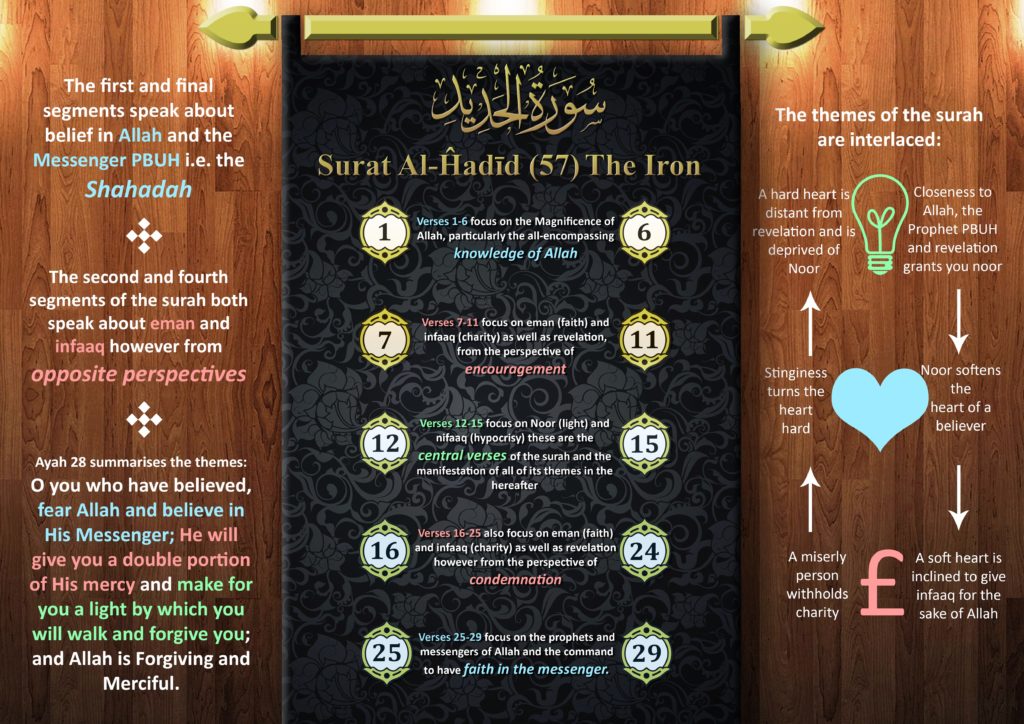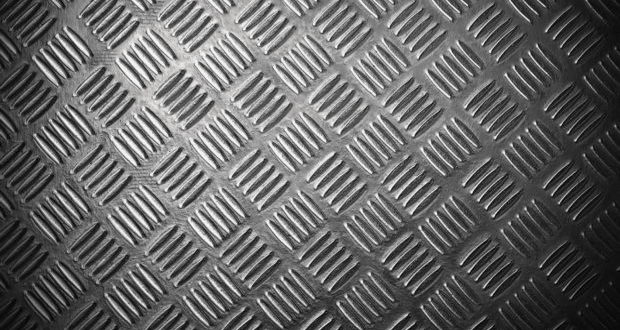Introduction
“…And We sent down iron, wherein is mighty power and benefits for mankind, and so that Allāh may test those who support Him and His messengers though unseen. Indeed, Allāh is Powerful, Almighty.”[1]
Sūrat al-Hadīd is known only by one name: “Iron.” The 57th chapter of the Qur’ān is so named after its 25th verse quoted above. Indeed, as with the namesake of the Sūrah, al-Hadīd is undoubtedly a mighty chapter, in which the benefits for mankind are abundant, and in which the tests of faith are grave.
With natural iron, a focussed process of refinement is required for the extraction of the pure substance. Iron ore must be smelted in a foundry and cast so that the mighty element can show its true capacity, in creation of architectural structures as well as its severe uses in warfare.
Likewise, in order to extract the fullest benefits from the Qur’ān, we must ponder and reflect over the verses within in great detail. We must heed the warnings conveyed, adopt the advice given and even challenge ourselves according to the expectations of our Creator seeking His approval and forgiveness.
In the following series of articles, we will endeavour to extract a portion of the benefits of Sūrat al-Hadīd. Together, we will enter the foundry and examine the pages of al-Hadīd, the 29 verses within, the 544 words, 1476 letters. Undoubtedly, we will fall short and so we ask Allāh to accept our efforts and to guide us along the way.
The Significance of Iron
Just the name of Sūrat al-Hadīd carries significant weight and it was chosen by the companions based on verse 25 of the chapter, in which Allāh (‘Azza wa Jall) says “…and we sent down iron…”
The substance of Iron has heavy emblematic significance. In many cultures iron is seen as the symbol of strength, military might and even justice. Aside from warfare the element of iron has innumerable general uses in every walk of life. In Sūrat al-Hadīd Allāh (‘Azza wa Jall) speaks of iron chiefly in the context of battle and weaponry, saying “in it is mighty (military) power and benefits for mankind.” This indicates that one of the main intended reasons for Allāh’s creation of the substance is in order for it to be used in sanctioned conflict for the checking of powers and in defence of just and noble causes. This sentiment is reflected in the content of the Sūrah, as Allāh speaks highly of those who do their duty and uphold justice by fighting the enemies of faith, preserving the honour, wealth and dignity of the believers.
The symbolism of iron goes deeper still. From a more abstract perspective, iron represents the middle ground which Islam occupies between the philosophies of monasticism and materialism. Violent Christian fanatics during the crusades and beyond undoubtedly lived and died by the sword, just as some Buddhists monks of Myanmar have demonstrated no aversion to bloodshed in their patterns of persecution and violence against local Muslim minorities. However, these parties do not represent the recognised theological foundations of their respective faiths. At their core, Christianity and Buddhism are deeply monastic in nature. These two faiths amongst others encourage secluded worldviews detached from worldly possessions and events. Such monastic faiths tend to teach that the world is corrupt and that believers should escape the realities of the world.
Conversely Jews in the time of Jesus (Peace be upon him) where reprimanded for being too worldly and of hardened hearts. This is where we find doctrines which lean more towards the material world. In fact, fervent materialism has tragically become the predominant doctrine of the modern age, and matters of the soul are given little to no heed at all. These doctrines teach that ‘you only live once’ and that the world is yours for the taking.
As ever Islam guides towards the middle path. In this case Islam teaches a balance between extreme monasticism and excessive materialism. Muslims are encouraged to be spiritually detached from worldly obsessions, while remaining vigilant and responsible of their duty towards social and political justice. A Muslim must not crave authority, luxury or wealth, yet at the same time he or she must be concerned with economic justice and the socio-political realities of the day. Islam teaches that indeed the world is prone to corruption. But it is not to be escaped, rather it is to be saved.
Islam recognises the sad reality of this world; that Iron and war is all too often a necessary means to achieving peace, as well as being the most efficacious deterrent against oppression, injustice and other manifestations of mankind’s darker nature. Allāh has sent iron to this earth because He wants the believers to uphold the fight for His sake. However, this struggle must never be for material gain. Warfare, when necessary and sanctioned must only be conducted for spiritual reasons, the establishment of truth and justice. As is often said, Islam is a religion of peace, but not an apathetic religion of pacifism.
Time of Revelation
As is well known, the Sūrahs of the Qur’ān are categorised as either Makki and Madani Chapters. That is, Sūrahs are divided into those revealed to Muhammad (Peace and blessings be upon him) before hijrah, in Makkah, and after hijrah in the new Islamic community of Medina.
This question is actually a matter of some controversy when it comes to Sūrat al-Hadīd. Ibn ‘Ashūr (rahimahu Allāh) says that no other Sūrah is as contested in regards to this question. Ibn ‘Atiyya says that while the beginning passages may resemble Makki verses, there is no disagreement that the Sūrah contains Madani verses too. [2]
Ibn ‘Ashūr argues that there is a strong case for this disagreement based on the nature of the verses in the Sūrah. To all appearances, the first nine verses of the Sūrah are Makki due to their focus on faith and the greatness of Allāh. Another key reason for this view is the statement of Ibn Mas’ūd regarding the verse:
“Has the time not come for those who have believed that their hearts should become humbly submissive at the remembrance of Allāh and what has come down of the truth? And let them not be like those who were given the Scripture before, and a long period passed over them, so their hearts hardened; and many of them are defiantly disobedient.”[3]
Regarding this verse, Ibn Mas’ūd said, as reported in Sahīh Muslim, “There must have been only four years between our becoming Muslim and this verse being revealed.” Ibn Mas’ūd was one of the very early Muslims of Makkah which is the cause for disagreement here.
However, in the main, it appears that the majority of scholars say that the Sūrah is Madani. The key supporting arguments for this view include following. Firstly, the fact that the Sūrah speaks of the Munāfiqūn (the Hypocrites), an adversary that arose only during the Madani era. Secondly the Sūrah refers to al-Fath (the conquest) which could only refer to either the treaty of Hudaybiyya or the conquest of Makkah. And as ever, Allāh knows best.
Virtues of the Sūrah
It goes without saying that the recitation of the Qur’ān is always virtuous. Every āyah of every Sūrah contains benefits beyond measure. However, various chapters of the Qur’ān have particular benefits and virtues which have been authentically narrated.
Sūrat al-Hadīd is one of seven chapters in the Qur’ān known as al-Musabbihāt. Al-Musabbihāt are so named as they begin with glorification of Allāh in the form of Tasbīh. In his tafsīr, Ibn Kathīr (rahimahu Allāh) reports that the Messenger of Allāh (Peace and blessings be upon him) used to read these chapters before going to sleep, and he would say “Indeed amongst them is a single āyah of greater value than one thousand āyahs.” According to Ibn Kathīr the āyah referred to here is verse 3 of Sūrat al-Hadīd:
“He is the First and the Last, the Ascendant and the Intimate, and He is, of all things, Knowing.”[4]
The unique virtue here is that reciting no further than the third āyah in Sūrat al-Hadīd will reap reward greater than that of over one thousand verses. Ibn ‘Atiyyah has also narrated that the Du’ās of a Muslim are answered when they are made after reciting this Sūrah. On that note, I invite the reader to recite this beautiful Sūrah from start to finish after we examine the interwoven themes of the chapter as a whole.
Recurring themes
A recitation of Sūrat al-Hadīd reveals a number of themes reinforced several times throughout the Sūrah. A close inspection shows that while the themes may appear to differ they are in fact intricately woven throughout the narrative of the Sūrah.
Two such themes are the call to have faith (īmān), and the command to give charitably in the cause of Allāh (infāq). It is important to point out that īmān is consistently presented in the Sūrah alongside the call for infāq. This is because the motivating force behind sincere infāq is unboundedly true īmān in Allāh and his messenger. For this reason, these complementary themes are presented in tandem as found in Verses 7, 8, 10 and 11.
Meanwhile, the antithesis to sincere belief is hypocrisy. This is another theme explored in the Sūrah. The dichotomy of believing light versus the darkness of hypocrisy is mentioned in verses 18, 19, 24 and 28.
Finally, the pinnacle of īmān is of course having faith in Allāh, and the chief aim of infāq is making the word of Allāh the highest in society, so that the role of the creator is made central in our daily lives. Hence, we find the opening of the Sūrah captures that message with a powerful description of Allāh and his command over his creation in the universe and beyond.
In the following section, we will observe the themes as separate passages throughout the Sūrah and the relationship between one passage and the next.
Thematic breakdown

For the purposes of our series, Sūrat al-Hadīd can be divided into 5 thematic passages.
1) Verses 1 to 6 comprise the first passage. In these verses the utter magnificence of Allāh is conveyed. A particular focus is given to His all-encompassing, flawless knowledge.
2) Verses 7 to 11 form the second passage. In this passage, Allāh instructs the reader to have faith and spend in His cause. This command is given from the perspective of encouragement. In this passage the call to spend has come after the glorification of Allāh. This cements the idea that Allāh is not in need of charitable giving and that rather it is the giver of charity that is in need of Allāh’s acceptance and reward.
Furthermore, the discussion of faith and its link to spending shows the expectation that faith in Allāh and his greatness necessitates action and worship in response, rather than just recognition alone.
3) The third passage is comprised of verses 12-15. This passage is about nūr, the precious light that will help the believers navigate their way through the darkness on the day of judgment to their blessed abodes in paradise. The verses move to give a harrowing description of the hypocrites on that day as they desperately scramble to get some of that light. Of course, they will be unable to get any and thus will be doomed to darkness and then hellfire.
This precious light that illuminates the path of the believers, will allow them to cross the treacherous bridge of al-Sirāt. The source of this invaluable light is belief in revelation, faith and righteous actions in this life. As a consequence, this middle passage is flanked by passages that speak about those crucial subjects.
4) Verses 16 to 25 form the fourth passage. This passage mirrors the second in that again a focus is given to īmān and infāq, however while passage approaches this topic from the perspective of encouraging charity, the fourth passage approaches this issue from the perspective of condemnation of miserliness; covering both positive and negative reinforcement.
5) The fifth and final passage of the Sūrah covers verses 25 to 29. Just as the second and fourth passages reflect one another, so too do the first and last. Once more it is faith that is discussed. The first segment covers faith in Allāh while the last passage commands faith in the messenger, completing the two articles of the testimony of faith: Affirming the oneness of Allāh and that Muhammad (Peace and blessings be upon him) is His messenger.
Conclusion
The exercise of thematic breakdown serves to uncover the overarching messages in Sūrat al-Hadīd. These passages are all intricately woven into a core coherent message which is as follows: Faith in Allāh, his messenger peace be upon him, and the revelation of Allāh is a source of Nūr for a believer. This Nūr softens the heart and a soft heart is inclined to give for the sake of Allāh. Giving grants more nūr and so on, blossoming ever more.
The converse message of warning is also included: A miserly person withholds charity. The heart of a miser is rendered hard, and a hard heart is distant from Allāh and his revelation and is thusly deprived of Nūr, and the heart with no nūr becomes more miserly and so on, in a downward spiral.
The key lessen to take from this is for the believer to never distance him or herself from the revelation as this will turn their hearts hard, which will lead them to become miserly and down the vicious spiral described. The believer must recognise that faith in Allāh and a charitable nature are part and parcel, inseparable traits of a sincere believing heart.
We will end this first article in the series with āyah 28 of Sūrat al-Hadīd, which is said to contain within it a summary of the entire Sūrah:
“O you who have believed, fear Allāh and believe in His Messenger; He will [then] give you a double portion of His mercy and make for you a light by which you will walk and forgive you; and Allāh is Forgiving and Merciful.”[5]
“O you who have believed Fear Allāh”
The crux the first passage.
“and believe in His Messenger”
The message of the fifth passage, completing the testimony of faith.
“He will [then] give you a double portion of His mercy”
Your charity is an investment that Allāh guarantees will be rewarded as in the second passage.
“and make for you a light by which you will walk and forgive you; and Allāh is Forgiving and Merciful.”
Your actions in this life, will have direct results on your experience in the afterlife, starting with the granting of nūr which will light your path to Paradise, just as in the third passage.
May Allāh not deprive us of this precious nūr, and may He forgive us, for He is forgiving and merciful.
[donationbanner]
Source: www.islam21c.com
Notes:
[1] Al-Qur’ān 57:25
[2] The view of it being Makki goes back to al-Kalbiyy according to Imam al-Tabari
[3] Al-Qur’ān 57:16
[4] Al-Qur’ān 57:3
[5] Al-Qur’ān 57:28








Ameen